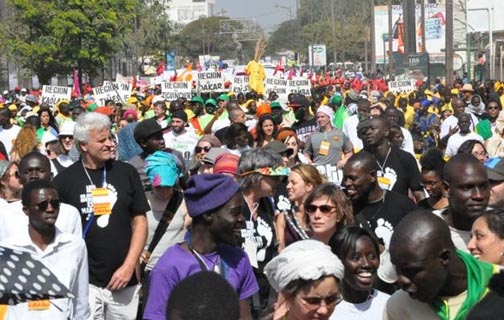Contrary to what some would like to believe, the World Social Forum process is alive and kicking and as strong as never before. From Feb. 6 to 11, 2011 the most recent WSF was held in Dakar, Senegal.
The opening march gathered over 75,000 people representing local and international movements and organizations. Over 130 countries were represented. Caravans from many African countries arrived by road. The forum provided space to over 3,000 self-organized activities and more than 40 peoples assemblies.
The ongoing Tunisian and Egyptian revolutions provided the background to the forum’s activities, giving a charged political environment to the entire process. As the final declaration of the People’s Social Movements stated:
“We affirm our support for and our active solidarity with the people of Tunisia, Egypt and the Arab world who have risen up to demand a true democracy and build the peoples power. Their struggles are lighting the path to another world, free from oppression and exploitation.”
Dakar was the venue to celebrate the 10th anniversary of the World Social Forum, the first being held in Porto Alegre in Brazil in 2001. “Since that time, we have built a common history of work which led to some progress, particularly in Latin America, where we have been able to intervene in neoliberal alliances and to create several alternatives for just development that truly honor nature”.
The social forum process is growing. In 2010 alone there were 19 national forums, five regional forums and 31 thematic forums all over the world involving an impressive number of organizations, networks and tens of thousands of people. Without falling into simplistic causality it is worthwhile noting that 10 social forums were held in the Arab world in 2010, the last being in Egypt!
One of the fundamental objective of the WSF process is to facilitate exchange of experience and promote formation of new strategic alliances. In Dakar, the self-organized activities for two days was followed by a two-day people’s convergence assemblies. These thematic assemblies gave space to the gathered social movements to plan their actions in the coming months and years.
Assemblies on climate change, food sovereignty, migration and others resulted in convergence of strategies of the global social movements. In the convergence assembly organized by the groups working in defense of Palestinian human rights it was decided to hold a thematic World Social Forum in Solidarity with Palestine sometimes in 2012. Brazilian groups have even offered to host this event!
World Social Forum 2013 in Montreal?
In Dakar, at the International Council meeting after the end of the Forum, concrete proposals were put forward arguing that the next WSF should be held in a country from the North. It was argued that the countries from the North play a central role in developing conditions that push the world population towards poverty, war and climatic disasters. The social movements in the North are thus at the frontline and there is a need that the social movements of the South lend them support.
Social movements in Canada and Quebec have a long history of social and political mobilization. The anti-war movement of 2003 prevented the Canadian government to embark on the U.S. bandwagon in the invasion of Iraq. And then again in 2001 the mass mobilizations with support from all major trade unions marked the end of the Free Trade Agreement of the Americas.
With the ongoing onslaughts on the civil society organizations and human rights groups across Canada by the present Harper government there is an increase in alliance building between progressive organizations, community groups and trade unions. The opposition is growing against the exploitation of shale gas and tar sands, and an attempt is being made to bring all environment groups in Canada together on the same platform during a conference “Cochabamba +1” that is due to be held in Montreal from 15 to 17 April this year.
Canada’s role in the occupation of Afghanistan, and its blind support to atrocities perpetrated by Israel on the Palestinian people have thrown immense challenges to the social movements in Canada. It is in this background that the Montreal/Quebec activists in the BDS campaign have decided to hold a BDS conference every year in October. With Quebec’s largest teachers union FNEEQ having adopted the BDS call against Israeli apartheid, an education campaign has been started in colleges gathering support and public opinion in solidarity with Palestinian human rights.
In 2009, Montreal was the venue of the meeting of international council of the WSF. In a reception organized for the IC members the Mayor of Montreal extended his invitation to hold an eventual WSF in Montreal.
A 150-strong Quebec delegation has proposed Montreal as the venue of the next WSF in 2013. Apart from Canada, Spain is also on the list as potential hosts. The next International Council meeting will be held at the end of May this year in Paris in parallel with the G-8 and G-20 meetings where the final decision will be made.
Feroz Mehdi is the general secretary of Alternatives International and a member of international council of the World Social Forum.



